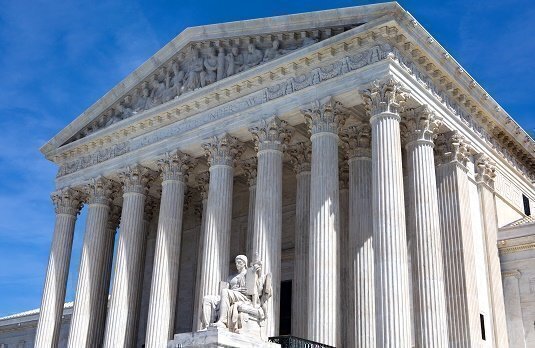The Trump Administration will ask the Supreme Court this week to uphold its power to end the “DACA” program that protects younger immigrants from deportation, and it will ask that the Justices not wait for a ruling by a federal appeals court, the Justice Department said Tuesday. (The five-year-old program is titled “Deferred Action for Childhood Arrivals.”)
 Attorney General Jeff Sessions said “we are now taking the rare step of requesting direct review [by the Supreme Court] on the merits…so that this issue may be resolved quickly and fairly for all the parties involved.”
Attorney General Jeff Sessions said “we are now taking the rare step of requesting direct review [by the Supreme Court] on the merits…so that this issue may be resolved quickly and fairly for all the parties involved.”
The Justices have the discretion to take on a case even before it has gone through all of the lower court levels, but they do not do that very often. It is a procedure that is reserved for major national controversies, especially when time is an urgent factor.
At issue in the case is the future situation of some 689,900 individuals currently protected by the “DACA” regime, which the Obama Administration set up in 2012 for younger immigrants who entered the U.S. illegally as children brought in by their parents. More than 793,000 had qualified for the program, but some of those permits have expired.
The Administration seeks to end the program entirely as of March 5. A federal judge in San Francisco, however, ruled last week that the termination of the program is likely to be found invalid and ordered that it not end as long as challenges to it were under review in that judge’s court.
The Supreme Court has already shown an active interest in this controversy, having ordered the judge – U.S. District Judge William Alsup – to rule promptly on Administration requests to dismiss the five lawsuits pursued by defenders of DACA. The judge did dismiss some of the claims, but he kept a number of significant issues alive, and ruled temporarily that at least some of them likely will succeed after the case is fully tried.
Before the Administration can ask the Supreme Court to take on the case itself, there has to be an appeal pending in a federal appeals court – in this instance, the U.S. Court of Appeals for the Ninth Circuit. Earlier Tuesday, the Justice Department formally took that step. The next step, which the Justice Department said would come “later this week,” will be to file its appeal in the Supreme Court.
The Supreme Court is rapidly approaching the point where it will not have time to decide new cases during the current term, but it can order expedited procedures that will enable it to hear and decide such a key case before recessing for the summer in late June.
Review of the DACA controversy by the Justices is almost a certainty at this point. (The Court is also very likely to announce this week that it is going to review the legality of another major Trump Administration initiative – the third version of a presidential order to sharply restrict entry into the U.S. of foreign nationals from nations with Muslim-majority populations. All of the legal papers have now been filed with the Justices in that case – from Hawaii – and a grant of review seems likely in a matter of days.)
The DACA program had no end date as it was created by the Obama Administration, and there had been times when it appeared that President Trump was in favor of keeping it intact. However, last September, his Administration decided to end it as of March 5 after concluding that it was not likely to withstand a court challenge that a group of states, led by Texas, had been planning.
There have been intense discussions in Congress about passing new legislation to protect DACA recipients, who are often referred to as “dreamers” because many of them have high hopes of growing up and becoming a part of America. The DACA program, while allowing hundreds of thousands of them to remain in the country, and to work and go to school, does not guarantee them a path to citizenship. The efforts in Congress to protect them from deportation have lately bogged down in bitter disagreements between the Administration and Democratic leaders in Congress, and negotiations have now been complicated by mixing the DACA discussions in with talks over avoiding a government shutdown later this week over budget disagreements.
Once the Administration has filed its DACA appeal, the challengers to termination of the program will file their answer, and the Justices could take up the question of granting review promptly. If granted, it might go to a hearing as early as March.
Legendary journalist Lyle Denniston has written for us as a contributor since June 2011 and has covered the Supreme Court since 1958. His work also appears on lyldenlawnews.com.







